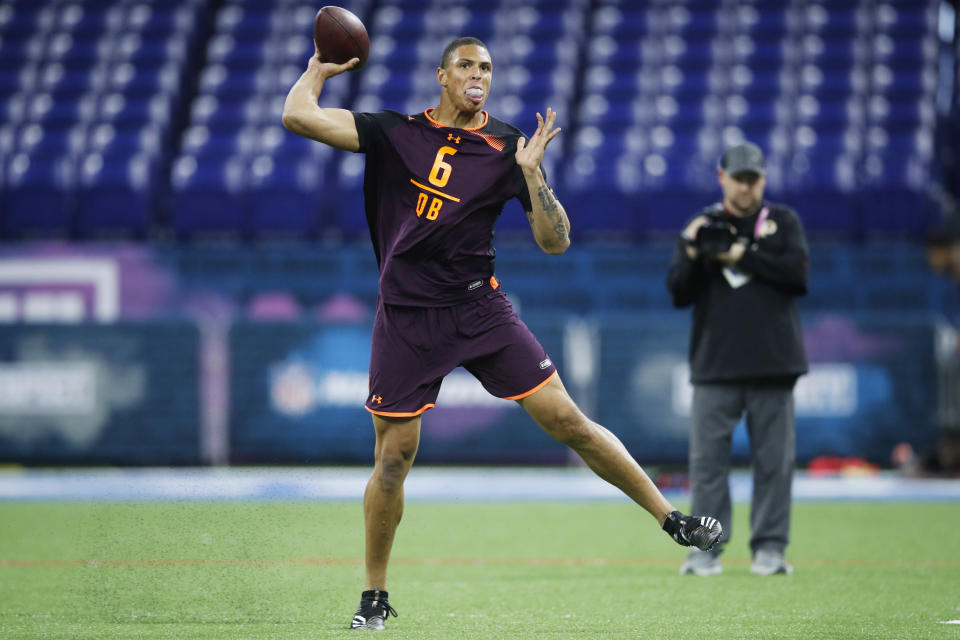NFL draft snub of QB Tyree Jackson exposes his bad gamble and inflexible NCAA rules
NASHVILLE, Tenn. – Arguably the biggest arm in the NFL draft has unquestionably suffered the event’s biggest disappointment.
Buffalo junior quarterback Tyree Jackson, touted by some as a potential third-round pick with developmental upside, went undrafted this weekend. This despite the NFL relentlessly scrounging for quarterback talent and teams typically being enthused at taking raw, big-armed projects late in the selection process.
Kyler Murray’s Pro Day at Oklahoma today. But also Pro Day for Buffalo QB Tyree Jackson, who will hold his at the Buffalo Bills facility, which is fitting. Jackson’s arm is as strong, if not stronger, than Bills QB Josh Allen. Many believe he will go higher than expected in draft
— Adam Schefter (@AdamSchefter) March 13, 2019
Apparently that wasn’t enough to gamble a draft choice on Jackson, who signed with the Buffalo Bills as an undrafted free agent shortly after the seventh round concluded Saturday.
It was a bitter fall for a player who made a huge mistake applying for the draft after his junior season. And it underscores two points that should be screamed from the mountaintops after every NFL draft:
Players must be careful who they listen to when making a life-altering choice with their talent.
And the NCAA sorely needs to create a second-chance eligibility application for underclassmen players to appeal for a return to school if they go undrafted.

Before we get to Jackson’s situation, let’s give consideration to the NCAA annually disavowing guys who make mistakes forgoing their remaining eligibility to take a shot at the NFL. It’s not a massive swath of players but it’s also not entirely small, either. In 2018, 37 of 106 early entrants went undrafted in the NFL. This year, 49 of 144 went undrafted. In many of those cases, college football (and the lives of the players) would have been better if those players were allowed an eligibility mulligan. But the NCAA has never come close to even thinking about changing that reality – at least partially because it might open a Pandora’s box where more underclassmen flood the draft.
There’s no proof of that, mind you. It’s just a theory. And it likely would only come to fruition based on how difficult it would be to regain NCAA eligibility. If a process was created where it was extremely difficult (but possible) to return to school, you might see some kind of eligibility reclamation process as a success story. Even if only a limited fraction of players regained their college standing. After all, some is better than none. But of course there is a flip side. If you make it easy to shuttle into the draft and back, well, then yes, it would likely be a disaster. It’s all about striking a balance that creates opportunity for players to recover from a mistake rather than a carrot that entices them to take a foolish chance and count on a safety net.
Would finding that balance and creating such a process be easy? No. But show me the argument that it’s not worth considering. It doesn’t hurt to weigh the upside of eligibility reclamation. Particularly in the case of someone like Jackson, who had just started to develop his raw skills as a quarterback in college when he listened to the wrong people and rolled the dice. Almost anyone you asked in the NFL said he should have stayed in college and polished his game another year. But he didn’t and the result was about as bad as it could be, with Jackson going unselected and now hoping to show the Bills or anyone else enough to snag a spot on a regular-season roster or practice squad. It’s not an impossible task, but it’s also the steepest kind of climb for an NFL quarterback.
That’s what Jackson now faces. It wasn’t a shock, given that when Yahoo Sports reached out to evaluators about him during the scouting combine, the responses were a jagged mix of conflicting opinions. Not only were there disagreements on what kind of athlete he was or whether he was a solid quarterback project — some couldn’t even agree on the strength of his arm which was supposed to be the easiest part of his evaluation. Such a scattershot picture among talent evaluators is never good for a player’s stock, especially when they’re already viewed as a player in need of significant development.
Interestingly, Jackson now ends up in camp with the player he was most often compared to by some evaluators: Bills second-year quarterback Josh Allen.
Some of them actually described Jackson as a less talented version of Allen in their assessments. Both had strong arms. Both were tall and carried a lot of size for their position. Jackson was faster in the 40-yard dash, but Allen was a better athlete with a more natural throwing motion. On the downside, both had accuracy issues, competition issues in college and had long roads ahead of them when it came to development. It might sound ideal that they’re now together, potentially learning some of the same lessons to cure similar problems. But to others, it’s hard enough getting over the hump with one quarterback project let alone two of them.
Not that it matters now. Jackson took his shot and it missed badly. Now he’ll have to take the hardest available path forward, with the least amount of job security possible. Just another addition to the annual underclassmen dumpster fire that gets set ablaze when the last pick comes off the board. Same as it was last year and the many before that. Same as it will always be, until the NCAA realizes that sometimes it’s better to let the talent back into school rather than wagging a finger and closing a door forever.
More from Yahoo Sports:

